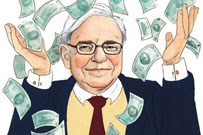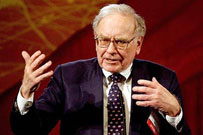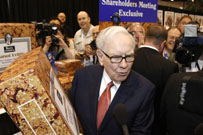Biography of Warren Buffett - Billions from the ground up
Warren Edward Buffett was born on August 30, 1930 to his father Howard, a stockbroker-turned-Congressman. The only boy, he was the second of three children, and displayed an amazing aptitude for both money and business at a very early age. Acquaintances recount his uncanny ability to calculate columns of numbers off the top of his head - a feat Warren still amazes business colleagues with today.
 At only six years old, Buffett purchased 6-packs of Coca Cola from his grandfather's grocery store for twenty five cents and resold each of the bottles for a nickel, pocketing a five cent profit. While other children his age were playing hopscotch and jacks, Warren was making money. Five years later, Buffett took his step into the world of high finance. At eleven years old, he purchased three shares of Cities Service Preferred at $38 per share for both himself and his older sister, Doris. Shortly after buying the stock, it fell to just over $27 per share. A frightened but resilient Warren held his shares until they rebounded to $40. He promptly sold them - a mistake he would soon come to regret. Cities Service shot up to $200. The experience taught him one of the basic lessons of investing: patience is a virtue.
At only six years old, Buffett purchased 6-packs of Coca Cola from his grandfather's grocery store for twenty five cents and resold each of the bottles for a nickel, pocketing a five cent profit. While other children his age were playing hopscotch and jacks, Warren was making money. Five years later, Buffett took his step into the world of high finance. At eleven years old, he purchased three shares of Cities Service Preferred at $38 per share for both himself and his older sister, Doris. Shortly after buying the stock, it fell to just over $27 per share. A frightened but resilient Warren held his shares until they rebounded to $40. He promptly sold them - a mistake he would soon come to regret. Cities Service shot up to $200. The experience taught him one of the basic lessons of investing: patience is a virtue.
In 1947, a seventeen year old Warren Buffett graduated from High School. It was never his intention to go to college; he had already made $5,000 delivering newspapers (this is equal to $42,610.81 in 2000). His father had other plans, and urged his son to attend the Wharton Business School at the University of Pennsylvania. Buffett stayed two years, complaining that he knew more than his professors. When Howard was defeated in the 1948 Congressional race, Warren returned home to Omaha and transferred to the University of Nebraska-Lincoln. Working full-time, he managed to graduate in only three years.
Warren Buffett approached graduate studies with the same resistance he displayed a few years earlier. He was finally persuaded to apply to Harvard Business School, which, in the worst admission decision in history, rejected him as "too young". Slighted, Warren applied to Columbia where famed investors Ben Graham and David Dodd taught - an experience that would forever change his life.
 Than he moved to the suburb of New York. Buffett spent his days analyzing S&P reports, searching for investment opportunities. It was during this time that the difference between the Graham and Buffett philosophies began to emerge. Warren became interested in how a company worked - what made it superior to competitors. Ben simply wanted numbers whereas Warren was predominately interested in a company's management as a major factor when deciding to invest, Graham looked only at the balance sheet and incomestatement; he could care less about corporate leadership. Between 1950 and 1956, Warren built his personal capital up to $140,000 from a mere $9,800. With this war chest, he set his sights back on Omaha and began planning his next move.
Than he moved to the suburb of New York. Buffett spent his days analyzing S&P reports, searching for investment opportunities. It was during this time that the difference between the Graham and Buffett philosophies began to emerge. Warren became interested in how a company worked - what made it superior to competitors. Ben simply wanted numbers whereas Warren was predominately interested in a company's management as a major factor when deciding to invest, Graham looked only at the balance sheet and incomestatement; he could care less about corporate leadership. Between 1950 and 1956, Warren built his personal capital up to $140,000 from a mere $9,800. With this war chest, he set his sights back on Omaha and began planning his next move.
On May 1, 1956, Warren Buffett rounded up seven limited partners which included his Sister Doris and Aunt Alice, raising $105,000 in the process. He put in $100 himself, officially creating the Buffett Associates, Ltd. Before the end of the year, he was managing around $300,000 in capital. Small, to say the least, but he had much bigger plans for that pool of money. He purchased a house for $31,500, affectionately nicknamed "Buffett's Folly", and managed his partnerships originally from the bedroom, and later, a small office. By this time, his life had begun to take shape; he had three children, a beautiful wife, and a very successful business.
Over the course of the next five years, the Buffett partnerships racked up an impressive 251.0% profit, while the Dow was up only 74.3%. A somewhat-celebrity in his hometown, Warren never gave stock tips despite constant requests from friends and strangers alike. By 1962, the partnership had capital in excess of $7.2 million, of which a cool $1 million was Buffett's personal stake (he didn't charge a fee for the partnership - rather Warren was entitled to 1/4 of the profits above 4%). He also had more than 90 limited partners across the United States. In one decisive move, he melded the partnerships into a single entity called "Buffett Partnerships Ltd.", upped the minimum investment to $100,000, and opened an office in Kiewit Plaza on Farnam street.
 The next year, Warren went much further than closing the fund to new accounts; he liquidated the partnership. In May 1969, he informed his partners that he was "unable to find any bargains in the current market". Buffett spent the remainder of the year liquidating the portfolio, with the exception of two companies - Berkshire and Diversified Retailing. The shares of Berkshire were distributed among the partners with a letter from Warren informing them that he would, in some capacity, be involved in the business, but was under no obligation to them in the future. Warren was clear in his intention to hold onto his own stake in the company (he owned 29% of the Berkshire Hathaway stock) but his intentions weren't revealed.
The next year, Warren went much further than closing the fund to new accounts; he liquidated the partnership. In May 1969, he informed his partners that he was "unable to find any bargains in the current market". Buffett spent the remainder of the year liquidating the portfolio, with the exception of two companies - Berkshire and Diversified Retailing. The shares of Berkshire were distributed among the partners with a letter from Warren informing them that he would, in some capacity, be involved in the business, but was under no obligation to them in the future. Warren was clear in his intention to hold onto his own stake in the company (he owned 29% of the Berkshire Hathaway stock) but his intentions weren't revealed.
Buffett's role at Berkshire Hathaway had actually been somewhat defined years earlier. On May 10, 1965, after accumulating 49% of the common stock, Warren named himself Director. Terrible management had run the company nearly into the ground, and he was certain with a bit of tweaking, it could be run better. Immediately Mr. Buffett made Ken Chace President of the company, giving him complete autonomy over the organization. Although he refused to award stock options on the basis that it was unfair to shareholders, Warren agreed to cosign a loan for $18,000 for his new President to purchase 1,000 shares of the company's stock.
By the late '70s, the his reputation had grown to the point that the rumor Warren Buffett was buying a stock was enough to shoot its price up 10%. Berkshire Hathaway's stock was trading at more than $290 a share, and Buffett's personal wealth was almost $140 million. The irony was that Warren never sold a single share of his company, meaning his entire available cash was the $50,000 salary he received. During this time, he made a comment to a broker, "Everything I got is tied up in Berkshire. I'd like a few nickels outside."
This prompted Warren to start investing for his personal life. According to Roger Lowenstein's "Buffett", Warren was far more speculative with his own investments. At one point he bought copper futures which was unadulterated speculation. In a short time, he had made $3 million dollars. When prompted to invest in real estate by a friend, he responded "Why should I buy real estate when the stock market is so easy?"
In 1988, he started buying up Coca-Cola stock like an addict. His old neighbor, now the President of Coca-Cola, noticed someone was loading up on shares and became concerned. After researching the transactions, he noticed the trades were being placed from the Midwest. He immediately thought of Buffett, whom he called. Warren confessed to being the culprit and requested they don't speak of it until he was legally required to disclose his holdings at the 5% threshold. Within a few months, Berkshire owned 7% of the company, or $1.02 billion dollars worth of the stock. Within three years, Buffett's Coca-Cola stock would be worth more than the entire value of Berkshire when he made the investment.
By 1989, Berkshire Hathaway was trading at $8,000 a share. Buffett was now, personally, worth more than $3.8 billion dollars. Within the next ten years, he would be worth ten times that amount. Before that would happen, there were much darker times ahead (read The Solomon Scandal).
During the remainder of the 1990's, the stock catapulted as high as $80,000 per share. Even with this astronomical feat, as the dot-com frenzy began to take hold, Warren Buffett was accused of "losing his touch". In 1999, when Berkshire reported a net increase of 0.5% per share, several newspapers ran stories about the demise of the Oracle. Confident that the technology bubble would burst, Warren Buffett continued to do what he did best: allocate capital into great businesses that were selling below intrinsic value. His efforts did not go unrewarded. When the markets finally did come to their senses, Warren Buffett was once again a star. Berkshire's stock recovered to its previous levels after falling to around $45,000 per share, and the man from Omaha was once again seen as an investment icon.



